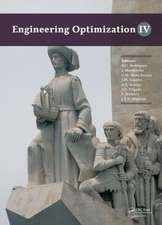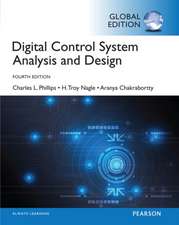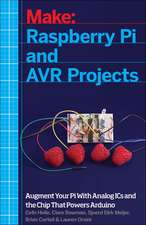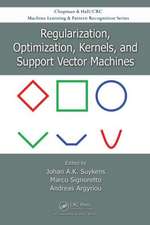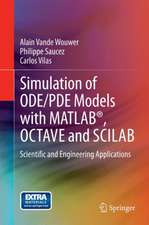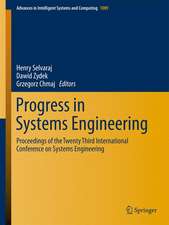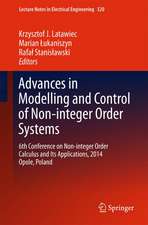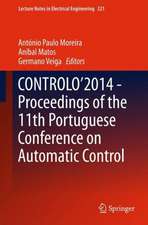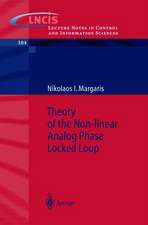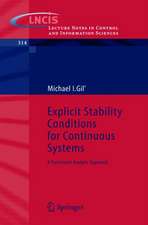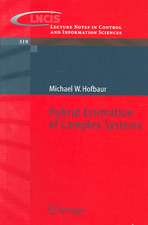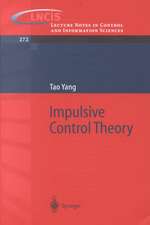Brain-Inspired Intelligence and Visual Perception: The Brain and Machine Eyes: Research on Intelligent Manufacturing
Autor Wenfeng Wang, Xiangyang Deng, Liang Ding, Limin Zhangen Limba Engleză Hardback – 5 mar 2019
This book presents the latest findings in the field of brain-inspired intelligence and visual perception (BIVP), and discusses novel research assumptions, including an introduction to brain science and the brain vision hypotheses. Moreover, it introduces readers to the theory and algorithms of BIVP – such as pheromone accumulation and iteration, neural cognitive computing mechanisms, the integration and scheduling of core modules, and brain-inspired perception, motion and control – in a step-by-step manner. Accordingly, it will appeal to university researchers, R&D engineers, undergraduate and graduate students; to anyone interested in robots, brain cognition or computer vision; and to all those wishing to learn about the core theory, principles, methods, algorithms, and applications of BIVP.
Din seria Research on Intelligent Manufacturing
- 24%
 Preț: 669.66 lei
Preț: 669.66 lei - 24%
 Preț: 936.11 lei
Preț: 936.11 lei - 18%
 Preț: 1008.12 lei
Preț: 1008.12 lei - 15%
 Preț: 640.71 lei
Preț: 640.71 lei - 18%
 Preț: 728.74 lei
Preț: 728.74 lei - 15%
 Preț: 636.30 lei
Preț: 636.30 lei - 15%
 Preț: 632.70 lei
Preț: 632.70 lei - 18%
 Preț: 943.57 lei
Preț: 943.57 lei - 15%
 Preț: 639.25 lei
Preț: 639.25 lei - 20%
 Preț: 923.31 lei
Preț: 923.31 lei - 18%
 Preț: 1103.77 lei
Preț: 1103.77 lei - 15%
 Preț: 635.31 lei
Preț: 635.31 lei - 18%
 Preț: 946.10 lei
Preț: 946.10 lei - 18%
 Preț: 945.79 lei
Preț: 945.79 lei - 18%
 Preț: 886.92 lei
Preț: 886.92 lei - 24%
 Preț: 828.59 lei
Preț: 828.59 lei
Preț: 640.88 lei
Preț vechi: 753.97 lei
-15% Nou
Puncte Express: 961
Preț estimativ în valută:
122.65€ • 127.57$ • 101.25£
122.65€ • 127.57$ • 101.25£
Carte tipărită la comandă
Livrare economică 14-28 aprilie
Preluare comenzi: 021 569.72.76
Specificații
ISBN-13: 9789811335488
ISBN-10: 9811335486
Pagini: 190
Ilustrații: XIV, 166 p. 89 illus., 87 illus. in color.
Dimensiuni: 155 x 235 mm
Greutate: 0.43 kg
Ediția:1st ed. 2020
Editura: Springer Nature Singapore
Colecția Springer
Seria Research on Intelligent Manufacturing
Locul publicării:Singapore, Singapore
ISBN-10: 9811335486
Pagini: 190
Ilustrații: XIV, 166 p. 89 illus., 87 illus. in color.
Dimensiuni: 155 x 235 mm
Greutate: 0.43 kg
Ediția:1st ed. 2020
Editura: Springer Nature Singapore
Colecția Springer
Seria Research on Intelligent Manufacturing
Locul publicării:Singapore, Singapore
Cuprins
Introduction of Brain Science.- The Vision Brain Hypothesis.- Pheromone Accumulation and Iteration.- Neural Cognitive Computing Mechanisms.- Integration and Scheduling of Core Modules.- Brain-inspired Perception, Motion and Control.
Notă biografică
Wenfeng Wang is currently the leader of a CAS “Light of West China” Program (XBBS-2014-16) and has been invited as the director of the Institute of Artificial Intelligence, the College of Brain-inspired Intelligence, Chinese Academy of Sciences (to be set up in Nov. 2017). He also serves as a Distinguished Professor and the academic director of the R&D and Promotion center of artificial intelligence in the Robot Group of Harbin Institute of Technology, Hefei, China. His major research interests include functional analysis and intelligent algorithms with applications to video surveillance, ecologic modelling, geographic data mining and etc. He is enthusiastic in academic communications in any way and he served as PC members and Session chairs of a series of international conferences associated with the brain-inspired intelligence and visual cognition.
Limin Zhang is currently a Full Professor and Tutor for Doctor with the Institute of Information Fusion,Naval Aeronautical University, Yantai, Shangdong, China. He was a senior visiting scholar at university college london (UCL) Modern Space Analysis and Research Center (CASA) from 2006 to 2007. His current research interests include signal processing, Complex system simulation and computational intelligence. More than 180 papers are published and 80 papers are indexed by SCI, EI. 2 monographs are published and 20 patents are applied and 6 were authorized. He has been selected as outstanding scientists in national science and technology and millions of talents in engineering research field and he is enjoying special allowance from the State Council.
Liang Ding is currently a full Professor with the State Key Laboratory of Robotics and System, Harbin Institute of Technology, Harbin, China. His current research interests include intelligent control and robotics, including planetary rovers and legged robots. Dr. Ding received several awards and he is an influential scientist in intelligent control of robots and has published more than 120 authored or co-authored papers in journals and conference proceedings.
Xiangyang Deng is currently a full assistant professor with the Institute of Information Fusion, Naval Aeronautical University, Yantai, China. His current research interests include video big data, deep learning and computational intelligence. Xiangyang Deng has rich experience in R & D management. He won 3 First Class Prizes and 2 Third Class Prizes of Military Scientific and Technological Progress Award. He published 9 papers about the topics in the past 3 years while 5 of them were indexed by SCI, EI. He has 2 patents and obtained 3 items of software copyright.
Dong Wang is currently a full professor and a supervisor of postgraduate at the Chinese academy of sciences, He also served as the director of IOT Production and Mobile Grain Networking Laboratory and the chairman of the International Alliance, His currentinterest focuses on brain-computer interaction and the classic brain intelligence research. Dong Wang published 20 papers, 45 patents and two books and was invited as visiting scholars and distinguished researchers by the Stanford University and Nanyang Technological University.
Limin Zhang is currently a Full Professor and Tutor for Doctor with the Institute of Information Fusion,Naval Aeronautical University, Yantai, Shangdong, China. He was a senior visiting scholar at university college london (UCL) Modern Space Analysis and Research Center (CASA) from 2006 to 2007. His current research interests include signal processing, Complex system simulation and computational intelligence. More than 180 papers are published and 80 papers are indexed by SCI, EI. 2 monographs are published and 20 patents are applied and 6 were authorized. He has been selected as outstanding scientists in national science and technology and millions of talents in engineering research field and he is enjoying special allowance from the State Council.
Liang Ding is currently a full Professor with the State Key Laboratory of Robotics and System, Harbin Institute of Technology, Harbin, China. His current research interests include intelligent control and robotics, including planetary rovers and legged robots. Dr. Ding received several awards and he is an influential scientist in intelligent control of robots and has published more than 120 authored or co-authored papers in journals and conference proceedings.
Xiangyang Deng is currently a full assistant professor with the Institute of Information Fusion, Naval Aeronautical University, Yantai, China. His current research interests include video big data, deep learning and computational intelligence. Xiangyang Deng has rich experience in R & D management. He won 3 First Class Prizes and 2 Third Class Prizes of Military Scientific and Technological Progress Award. He published 9 papers about the topics in the past 3 years while 5 of them were indexed by SCI, EI. He has 2 patents and obtained 3 items of software copyright.
Dong Wang is currently a full professor and a supervisor of postgraduate at the Chinese academy of sciences, He also served as the director of IOT Production and Mobile Grain Networking Laboratory and the chairman of the International Alliance, His currentinterest focuses on brain-computer interaction and the classic brain intelligence research. Dong Wang published 20 papers, 45 patents and two books and was invited as visiting scholars and distinguished researchers by the Stanford University and Nanyang Technological University.
Textul de pe ultima copertă
This book presents the latest findings in the field of brain-inspired intelligence and visual perception (BIVP), and discusses novel research assumptions, including an introduction to brain science and the brain vision hypotheses. Moreover, it introduces readers to the theory and algorithms of BIVP – such as pheromone accumulation and iteration, neural cognitive computing mechanisms, the integration and scheduling of core modules, and brain-inspired perception, motion and control – in a step-by-step manner. Accordingly, it will appeal to university researchers, R&D engineers, undergraduate and graduate students; to anyone interested in robots, brain cognition or computer vision; and to all those wishing to learn about the core theory, principles, methods, algorithms, and applications of BIVP.
Caracteristici
Presents and applies the hypothesis of machine brain vision Integrates machine brain cognition with its visual perception Establishes a systematic framework of brain-inspired intelligence Links robots’ visual cognition with other core modules of machine brain vision Interprets and achieves brain-inspired intelligence as 3-Layer Intelligence


